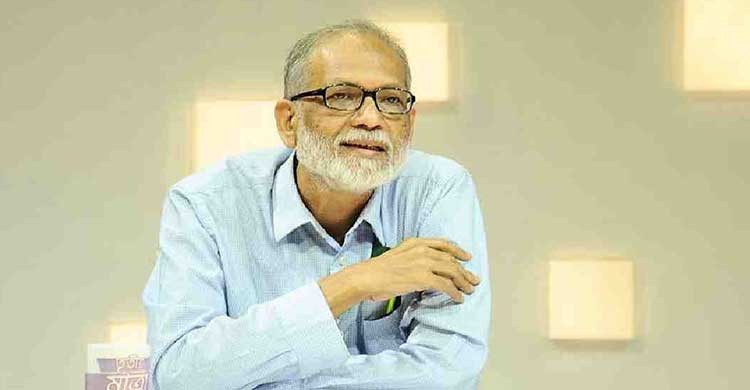‘Media is considered a subsidiary to national politics’
22 December 2021, 03:03 pm | Updated: 01 April 2025, 12:37 am

Afsan Chowdhury is a Bangladeshi liberation war researcher, columnist and journalist. He received Bangla Academy Award in 2018 for his contribution to the liberation war literature.
Mr Chowdhury was born in Dhaka on February 16, 1952. After completing his higher education from the Department of History in Dhaka University, he started his career in journalism. During his career as a journalist, he served as an editor for Dhaka Courier, contributed to The Daily Star and also produced a number of BBC World Service series. He was also one of the founder Promoter of United News of Bangladesh, one of the country's leading news agencies. He is a teacher of BRAC University and runs the Diversity Studies Cluster.
Afsan Chowdhury has given an interview to Dhaka Prokash (DP) about different contemporary issues of journalism, irregularities of journalists.
DP: Is journalism in right track in the country?
Afsan Chowdhury: This question assumes there is a correct path which is not correct. Journalism is a diverse professional and service sector space whose prime objective is to provide information without bias. Opinions come as a subsidiary act and so does other roles including upholding social justice. However, it’s generally assumed that media must play a political activist role as it did under colonialism and later under Pakistan. And its cause is to support social reforms. This is not correct. Journalism can lead to social reform but that is not its objective.
Media is considered a subsidiary to national politics and it is/was not free by choice. It was playing a junior role to politics and ultimately parties in the past and as its tradition does so now. While political objectives were achieved media’s own role was damaged. So independent media is not what the consumer or professionals want, they want partisan media. The result is the crisis we have in media today.
Most consumers are unhappy because they look for political activist role and not finding it think media isn’t doing what they are supposed to do.
We did a “perception of media” study this year and found that both media and consumers think that best journalism is activist journalism and not objective journalism. They want politics not information.
So what we have is a media which wants to be political, consumers who want the same and political institutions also. People are not interested in information but mostly want opinion and information that support their cause not the whole truth.
This however reflects the interest of the middle class the politically interested group but the rich who are media outlet owners and the rest who are not ‘shushil middle class’ really don’t have much interest in mainstream/pro media. They consume digital media including social media and that’s their own domain. For the majority of people, social media matters only /mostly. Hence professional media as we know it is severely marginalized.
Hence the question construction is itself not correct.
DP: What is your opinion to bring the country’s journalism in right path?
Afsan Chowdhury: Journalism is multiple so no one answer suffices but media workers need capacity building in which there is very little investment or interest. Corona reporting –which was of low quality shows most had no idea about the crisis and so mis-reported causing harm in many cases. As many media outlets have emerged but the economics is poor, top quality professionals are not coming to this profession. Its intake is not good enough in terms of quality and a section of them have turned to activities which draws social criticism. Media today is less trusted than it ever was. Blame for that goes to all- political, economic and social institutions including the media itself.
DP: How can responsible journalism and honest journalism play vital role in the country?
Afsan Chowdhury: By being that precisely but the market has been severely damaged by sensationalist media which to survive and gain clicks becomes that. Only nice media can be of quality not media in general. Its failure to compete with social media has caused this disaster. market forces are at play here.
DP: Are the news media enjoying freedom? Are there any government control and censorship? What is its impact on sate and the society?
Afsan Chowdhury: Media is owned by the Establishment comprised of the Owner and his allies and perhaps the Editor. Professionals are not subjected by GOB censorship first. They experience far greater censorship from the owners which is natural. The media establishment is linked to the GOB and doesn’t want to disturb the relationship with the GOB as they are a prime source of income and privileges. Activist journalists –essentially political- will often twist a news to suit their agenda and most media disliked to any GO has political links. Very few censorship conflicts arise over real news.
No news which goes against the interest of the owner can be passed which shows that censorship begins at home.
Since political power is linked to politics and politics is about individuals in BD, any news on certain individuals will cause censors to act.
So it’s not just the GOB which censors but everyone who can censor does so including advertisers as our research shows.
Since the governance construct is not strong, lack of confidence affects’ all including media and the GOB leading to censorship.
Do you think that Digital Security Act and Official Secrecy Act are barriers for good journalism?
Any law which can be freely available for suing by anyone is a problem. But the main focus of DSA is not paid media but social media. Paid media has owners who can be threatened without DSA which works but social media has no ownership hence the DSA is needed more here. However, a sense of anxiety hangs over all so quality is affected due to self-censorship. However, media doesn’t see freedom as a facilitator of information distribution but their agenda based opinions more. They also want freedom to abuse which is common in social media.
Nor does censorship affect all news sectors but a selected few. However, media moans about DSA but doesn’t do quality journalism in others sectors so it’s not so simple. The focus is on political roles of journalists and media. In some cases, it’s becoming an excuse to say media quality is affected by DSA and such laws when media quality is in reality not high. Media is in denial about its internal quality crisis.
DP: What should we do in protecting journalists?
Afsan Chowdhury: Capacity building, Code of Conduct for all including owners, media monitoring by media members and building specialized media with its own business model. One media size won’t work for all. Days of general media is over with the emergence of social media. Focus nice media alone can survive. Market can’t afford so many outlets as they are now. They reflect the desire of owners to be visible for whatever reason not quality and need…
DP: Many owners are being editors of news media outlets and they are controlling media. What is being happened for this?
Afsan Chowdhury: Media was never in the hands of journalists. Owners always controlled and do so now and will do more. Only social media is free for all. Switch in ownership won’t make much difference. Will media accept a Code of Conduct for all? And without investors how will media begin and survive? who will sustain media when it doesn’t make money. So, it makes no sense. Only media guidelines which everyone listens to can resolve the crisis somewhat.
DP: Is there any necessity of different organization of journalists?
Afsan Chowdhury: It’s part of the trend to use organizational networks to put pressure, gather strength in negotiations and also gain access to the higher powers and class and resource accessing...Its born out of the owner’s desire to reach out to the ruling class and the media workers want to do the same.
DP: What are the ways to stop irregularities of journalists?
Afsan Chowdhury: It can’t be stopped as the problem begins in the nature of governance of the state, politics, business and media too. One can refuse to be part of it but it won’t go away. Owners to workers all do it in cases.
DP: Sometime, it is said that the journalists are involved in different irregularities due to lack job security and monetary facilities. What is your opinion in this regard?
Afsan Chowdhury: Some do but corrupt ones take advantage of the opportunity. Increase of salary of bureaucrats hasn’t reduced corruption.
DP: Though most of the media outlets appoint district and upazila correspondents but they (correspondents) are not given proper salary. So, they are getting chance to involve in irregularities. What is your opinion in this regard?
Afsan Chowdhury: Several reasons operate. One is above. Others are, these local journalists are often involved in local level activities including in cases corruption of various kinds. Others do it as a way of a new livelihood based on threat and could even be part of a large organized groups.
DP: The image of the journalism is being tarnished due to enormous and IP TVs and news portals. What should be done to overcome the situation?
Afsan Chowdhury: Presence of many media outlets and media outlets without quality are too different issues. Many outlets are not a problem. If they resort to criminal activities, laws should be there to deal with them. But the big issue is that none of them are of quality. A general criminal trend exists in all sectors and they should be seen as part of the e-corruption trend in general. However, no one is interested in quality as it serves no political or economic objectives.






















